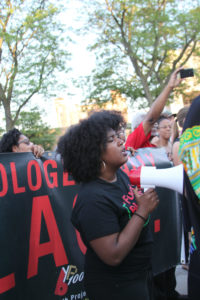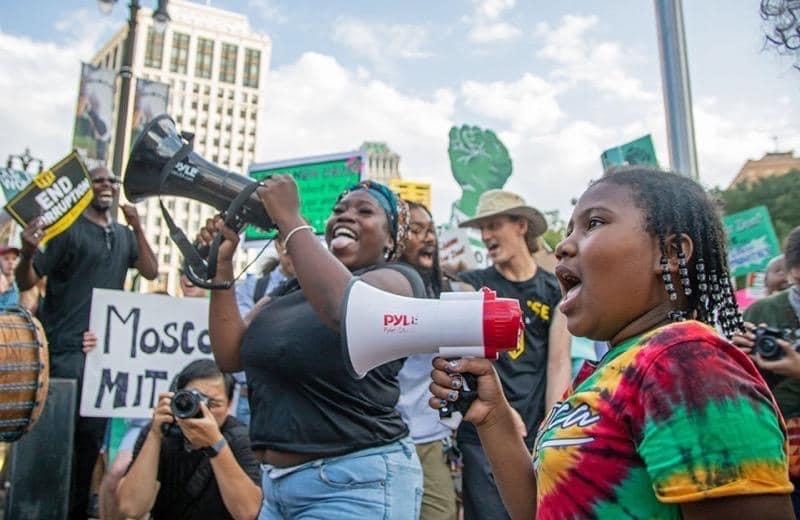‘She Safe, We Safe’:
A New Focal Point For Black Liberation
by Atinusewakaraiye “Tinu” Roland
In the midst of a global pandemic that has forced myself and many others across the world to be at home, I have had the time to process my thoughts around what my work really means to me. I am an aspiring abolitionist & freedom fighter, and I will not rest until ALL Black people are free.
In reality, what does that look like as a praxis? How is this actually embodied? Sitting through a time of political turmoil and hella uncertainty the quote, “We are the ones we have been waiting for,” rings in my head over and over. Our time is now; our moment is now. So many of us throughout the world have realized that the systems of oppression that continuously dehumanize us as people have to be abolished, and a new way of living, through liberation, needs to happen. Unfortunately, oppressive systems did not manifest overnight, so there is no easy fix, but there are people in communities everywhere that are working towards our collective liberation. adrienne marie brown refers to us as emergent. She says, “Emergence notices the way small actions and connections create complex systems, patterns that become ecosystems and societies. Emergence is our inheritance as a part of this universe; it is how we change. Emergent strategy is how we intentionally change in ways that grow our capacity to embody the just and liberated worlds we long for…. In the framework of emergence, the whole is a mirror of the parts. Existence is fractal— the health of the cell is the health of the species and the planet.” I like to think that I am a fractal in the movement of liberating Black people.
Emergence is also how I view my work and the ways in which it all intersects and contributes to the ecosystem we are building in Detroit around liberation. My political home at BYP100 Detroit is an abolitionist youth organization that embodies the practice of ‘black queer feminism’. This principle asks, how can those of us with privilege empower those of us who experience more oppression based on being trans, queer, feminine, undocumented, poor, or disabled?
What that means to me is that those who are closest to the margins of society’s oppressed peoples have to be at the focal point of everything that we do. For far too long black women (trans and cis), girls, and gender non-conforming people have existed at the epicenter of social hatred, fueled by stereotypes and damaging societal standards.
This level of oppression reminds us that in order to get free we must take the Black Queer Feminist approach. My work in the organization is building out the Detroit Chapter as our Membership chair. I also am leading our ‘She Safe We Safe’ (SSWS) campaign efforts in Detroit. She Safe We Safe is a transformative movement campaign to address the gender violence impacting Black women and girls (both trans and cis), as well as gender non-conforming people. We understand gender violence as something that happens both between individuals in communities, and as something that is perpetrated and sanctioned by the state. We define the state as the governmental institutions that organize society, such as law enforcement agencies, public schools, child protective services, welfare agencies, and public housing. During the current COVID-19 epidemic, this moment has allowed the reality of gender violence to be seen even more clearly.
Just recently I was made aware of an incident regarding a couple I knew. After several altercations and breakups, her life was taken by the person she chose to call her boyfriend. I found out about this incident after reading the news of a woman who killed her husband here in Detroit. The sad reality is, gender violence is not just domestic. It is perpetrated by the state and interpersonal. This level of violence is seen in every facet of our existence.
Our ‘She Safe We Safe’ campaign has allowed us to be the container of stories for those who are always silenced. One of the beautiful things I have found about the campaign is the way in which we love and support participants as they share their stories with us. During one of our kitchen table talks (small intimate group settings where we discuss how gender-based violence has shown up in our communities and in our lives), I received a text from a participant who was unable to make it, saying that she was going through a lot and was not coming to the event. I was understanding of her situation but it sat heavily on my heart. I called to talk with her after to find out her daughter had been suspended the prior week from school due to a bullying situation that not only was unresolved, but was progressing further— in addition to having a mentally abusive husband. This story is relevant to my thinking today as I reflect on these intersections. I also organize parents and youth with 482Forward; we do education advocacy and organizing throughout the city of Detroit, through neighborhood-based organizing. So, when I heard her issues I immediately jumped into organizing mode. As a parent myself, I recognize the school-to-prison pipeline our youth are on. I am also able to recognize our communities’ significant gaps in resources, teachers, food, mental health resources, true restorative practices, emotional intelligence, and cultural agility. Her story was not unique but it was valuable. I see disciplinary solutions that fail our youth every day. Her daughter ultimately ended up being suspended for the remainder of the year due to half of the gaps I named.
See, I struggle a bit in this moment when I think of what that means. In a bigger picture that means a young person has been punished for protecting themselves when no one else would. This means that someone is currently at home from school with a parent who experiences different levels of gender violence and sadly someone who has been failed by our current systems. It baffles me how interconnected these issues are and that our people are still being forced to deal with this oppressive, sad reality— one that, even during a global pandemic, has not stopped. This is what makes the Black Queer Feminist theory important. It is the will to protect the most vulnerable at all costs.

When I think of what liberation looks like, it is the will to push far beyond what we know now. It is the emergence of something new that swarms together like little starlings. We are here at the crossroads, the choice to decide whether or not “ the future and liberation are the same thing” (Maria Ibarra). This is the moment that requires us to create our own ecosystem, and how we will choose to live. Our fractal existence is just that— a piece of our liberatory world. I challenge everyone to push past your comfortability levels and challenge your thinking— imagine a world where we all are free. There is no prison industrial complex, nonprofit industrial complex, ‘isms’ (i.e. capitalism), phobias (i.e. transphobia), attacks on K-12 education with a clear path to prison (school-to-prison pipeline), food insecurities, homelessness, or so many others that we all know we have a laundry list of in this current environment.
How do we begin to change our political climate in Michigan? We start within our communities, our organizations, and we make what is deemed impossible possible. We shift our energy and our focus, we no longer continue to play the game of life the way our government has dealt it to us. We build our world the way we see fit and begin playing it that way, because that is what freedom looks like.
Last summer, BYP100 Detroit Chapter hosted a political education around hyper-surveillance in the city of Detroit (Project Greenlight). Our coalition is Greenlight Black Futures. We host political education in communities, designed to make space for participants to dream of a world where oppressions such as mass surveillance, food insecurities, and poor education are not factors. Community members sat in the conference room at Focus HOPE and dreamed of having access to mental health institutions; transportation options that are safe, clean and affordable; love and support in their lives; individuality (the right to be who you are and not have to constantly grapple with who you are and if it is ok); no pollution and misuse of the planet; a world where water and other earthly essentials are not owned by corporations but are given back to the land; access to affordable and quality education and childcare; and the elimination of food deserts (everyone has the access to fresh and healthy foods). Not only did community members dream, but they began creating a plan to shape and affect the change we want to see.
While in prison, Assata Shakur’s sister wrote her a letter. Inside were some of the most powerful words of love and liberation I have read. She said: “It is our duty to fight for our freedom. It is our duty to win. We must love each other and protect each other. We have nothing to lose but our chains.” What that means to me is that we need to continue to break systemic barriers, whether small or monumental. It is time to dream of our world, and then plan how we get free. We are in this thing called life together and the only way we win is collectively. People have suffered for hundreds of years, and continue to suffer to this day. We have nothing else to lose but the chains of oppression that bind us. What will I do? What will you do? How do we do it together?
Atinusewakaraiye “Tinu” Roland (she, her, hers) is a community organizer, a Black Political Strategist (through Black Queer Feminism, Abolition). She is a mother of three. She sits on boards around education advocacy, a host of committees and resides in Detroit, Michigan where she is a frequent speaker, trusted advocate and devoted friend to those around her. Tinu’s favorite quote is ” We are each other’s harvest, we are each other’s business, we are each other’s magnitude and bond.”¹
¹ from poem, “Paul Robeson”, by Gwendolyn Brooks, first published in the poetry collection, Family Pictures, Broadside Press, 1970


